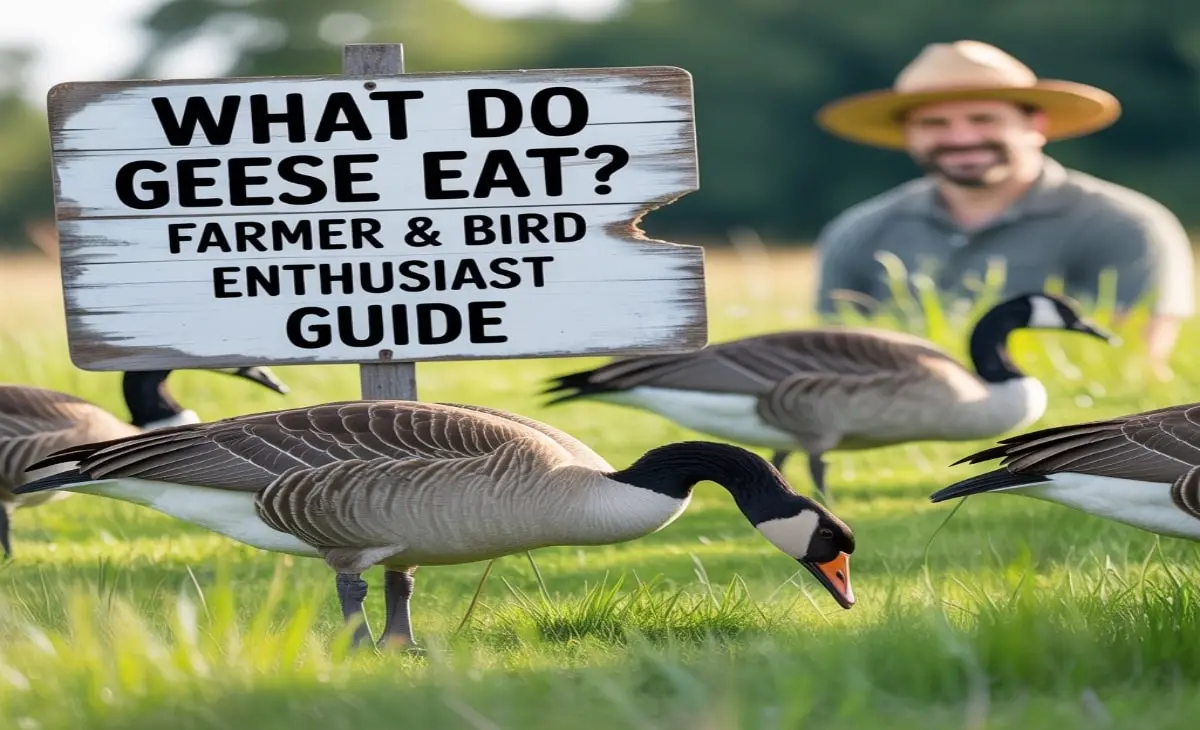If you’ve ever watched geese grazing by a pond or in a field, you may have wondered: what do geese eat? Are they herbivores, omnivores, or do they eat almost anything like ducks? This question matters not only to curious birdwatchers but also to farmers raising domestic geese and anyone managing land where wild geese forage.
I’ve worked with geese both on small farms and in wildlife observation projects. What struck me early on is how adaptable their diet is, yet how much their well-being depends on the right food sources. Feeding geese properly can improve their health, increase egg production, and reduce aggression. Misfeeding them, on the other hand, can lead to illness, poor growth, and even shortened lifespans.
This article provides a detailed, experience-backed guide to the diet of both wild and domestic geese, separating myths from facts and giving you practical, actionable advice.
Understanding the Natural Diet of Geese
Geese are primarily herbivores. In the wild, their diet consists of grasses, sedges, aquatic plants, and occasionally small insects or mollusks. Unlike ducks, which tend to forage more diversely, geese spend much of their day grazing on land.
From my field observations, wild geese often behave like “feathered lawnmowers.” They nibble short grass blades meticulously, moving slowly across a field. Their digestive systems are designed for a high-fiber, plant-based diet, which helps them extract nutrients from tough vegetation.
However, their diet isn’t static. Seasonal availability influences what they eat. In spring and summer, they prefer fresh green shoots. In autumn, they forage for grains and seeds to build fat reserves for migration. During winter, they rely more on agricultural leftovers like corn, barley, or wheat.
What Do Domestic Geese Eat?
Domestic geese share much of the same dietary preference as wild geese but rely more heavily on human-provided feed. When I raised geese on pasture, I noticed they ate grass voraciously during the day but still required supplemental grains, especially in colder months when grass growth slowed.
A balanced domestic goose diet includes:
- Fresh grass and weeds: Geese thrive when allowed to free-range on pastures.
- Grains: Oats, wheat, and cracked corn are commonly given for energy.
- Pellets formulated for waterfowl: These ensure balanced protein, vitamins, and minerals.
- Vegetables and greens: Kale, lettuce, spinach, and even carrot tops make excellent supplements.
I’ve also found that geese prefer natural foraging to being hand-fed pellets. Allowing them to graze reduces feed costs and improves their temperament, as they get exercise while eating.
Foods You Should Never Feed Geese
One of the most common mistakes people make is feeding geese bread. While it may seem harmless, bread is essentially “junk food” for birds. It fills their stomachs without providing nutrition, leading to malnutrition and deformities like “angel wing.”
Other foods to avoid include processed human snacks, chocolate, onions, and foods high in salt. These can be toxic or at least harmful to their digestion. In one community park I monitored, geese frequently fed on discarded bread and chips showed visible signs of poor feather quality and lethargy compared to those with access to natural forage.
Seasonal Feeding Patterns of Geese
what do geese eat don’t eat the same thing year-round. Their diet adjusts naturally with the seasons, and for domestic flocks, caretakers should mimic this cycle.
In spring, geese seek tender grasses and nutrient-rich shoots. Summer brings plenty of fresh vegetation and occasional insects. Autumn is when they crave grains and seeds, fattening up for migration or colder weather. Winter diets lean heavily on stored grains, supplemented by hay or silage for farm-raised geese.
A useful visual would be a seasonal feeding chart showing geese diet preferences across the four seasons. This helps farmers plan pasture management and supplemental feeding schedules.
Common Myths About What Geese Eat
One myth I often hear is that geese are aggressive grain scavengers who eat anything in sight. While they do enjoy grains, their core preference remains grass and leafy greens.
Another myth is that geese can survive entirely on kitchen scraps. This is false and potentially harmful. Geese need structured diets, not random leftovers.
Finally, some people believe what do geese eat large numbers of insects or fish like ducks. While they may occasionally consume small invertebrates, this forms only a tiny part of their diet.
How to Feed Geese Safely and Effectively
If you’re responsible for geese—whether wild visitors on your property or a domestic flock—you need a practical feeding approach. Based on my experience, here’s a proven framework:
Start by giving geese access to safe grazing areas. Their health improves dramatically when they can graze freely. Supplement this with grains, but only in moderate amounts to prevent obesity. If using pellets, choose waterfowl-specific feeds rather than generic poultry feed.
Always provide clean water near feeding areas. Geese need water to swallow and digest food properly. When I experimented with dry feeding, what do geese eat struggled, whereas having water basins nearby made them eat more calmly and efficiently.
Lastly, consistency matters. Geese thrive on predictable feeding routines. Sudden changes in diet can stress them or cause digestive problems.
Real-World Applications
Understanding goose diets isn’t just academic—it has practical uses. Farmers use knowledge of goose grazing behavior for weed control. Parks manage goose populations by controlling what food is available. Wildlife what do geese eat adjust feeding plans seasonally for rescued geese.
For example, in one pasture rotation project I worked on, geese helped keep grass trimmed in orchards, reducing mowing costs. Their diet preference for weeds also made them natural helpers in managing unwanted vegetation without chemicals.
FAQs
Do geese eat bread?
No. Bread lacks nutrients and can harm geese, leading to malnutrition.
Are geese herbivores or omnivores?
Geese are primarily herbivores, though they occasionally eat insects or snails.
What do baby geese (goslings) eat?
Goslings eat tender grass, starter waterfowl feed, and finely chopped greens.
what do geese eat in winter?
In winter, they rely on grains, seeds, and agricultural leftovers when grass is scarce.
Can geese eat vegetables?
Yes. Leafy greens like kale, lettuce, and spinach are excellent supplements.
Conclusion
So, what do geese eat? The short answer is: geese thrive on a diet centered around grass, supplemented with grains, seeds, and greens. While they may occasionally eat insects, they are primarily herbivores. The right diet supports their health, productivity, and behavior.
For farmers, this knowledge can reduce feed costs and improve flock management. For bird lovers, it helps ensure geese in parks and backyards stay healthy. And for the simply curious, it gives insight into how these remarkable birds survive and thrive year-round.




